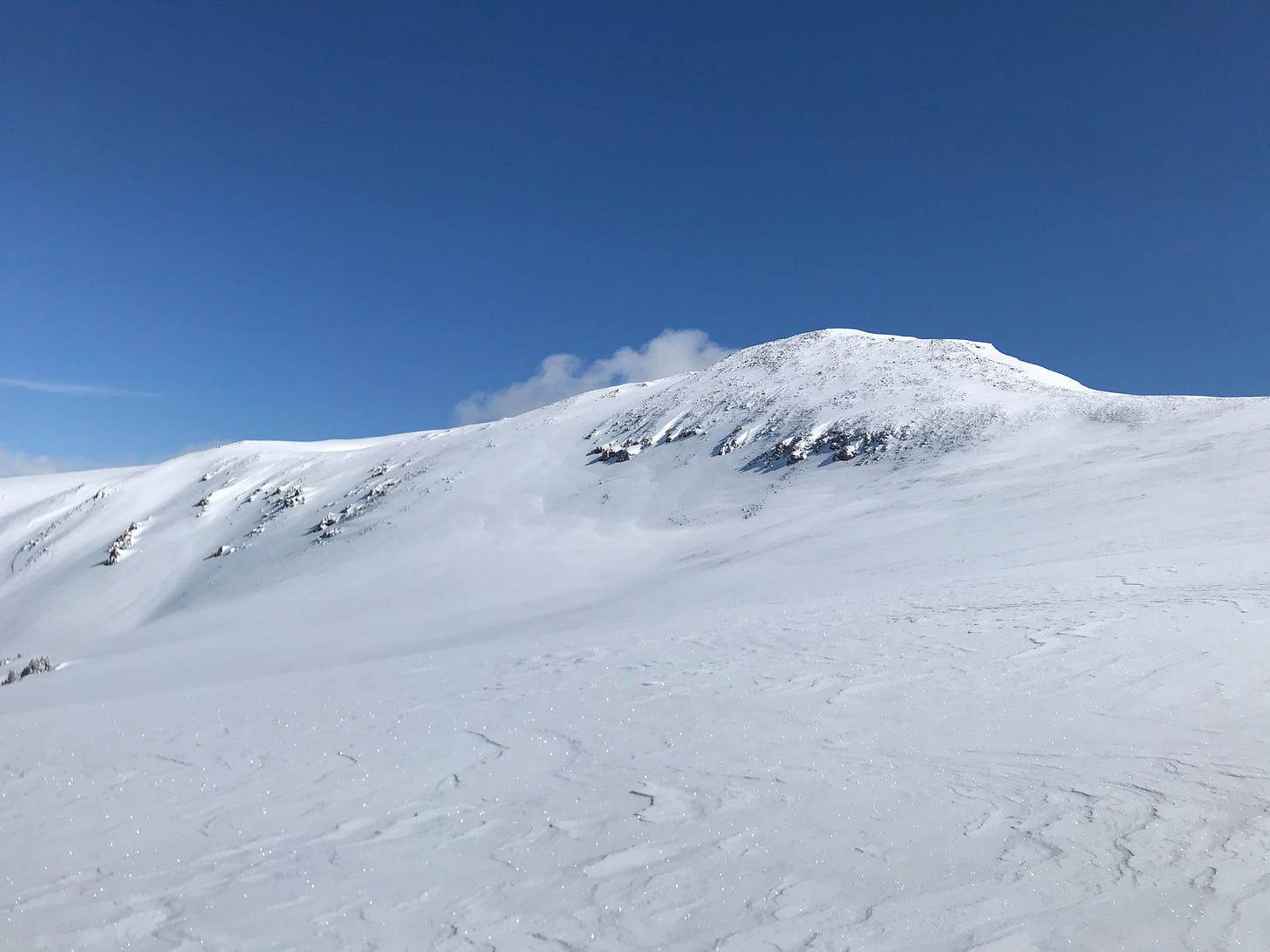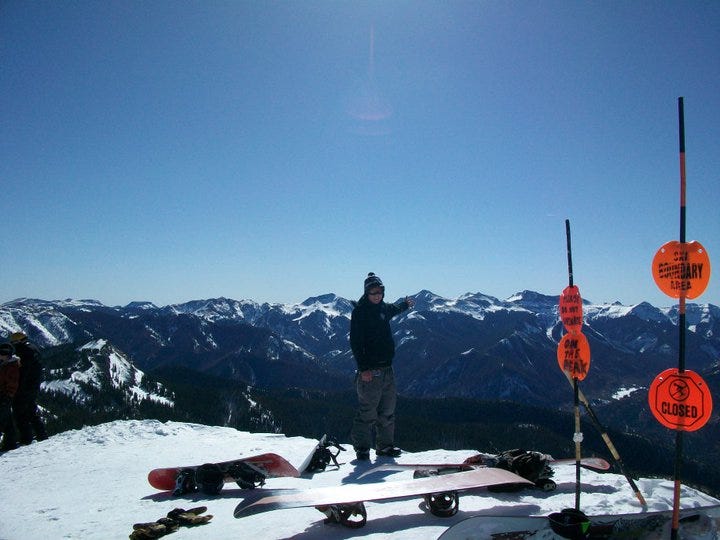As surely as his long gray locks still stream in the wind from underneath a torn beanie each time the snow flies, the spirit of the true ski bum never dies.
Hey reader,
Here we are in February. This fourth edition marks the one-month birthday for Mountain Remote. Today’s essay recalls a time when life was simple — when powder days and easy nights were the norm, not the exception.
This is especially relevant for me in 2022. Having an infant daughter has severely limited my days on the mountain this season. The trade-off is worth it in a million ways, but in recent weeks I’ve found myself looking back to the “Never Summer” days.
So it goes when I’m staring out my kitchen window at the snow-covered Grand Mesa, rather than being on the mountain myself.
I hope you enjoy this installment.
Community shoutouts
First, a shout out to the 6 new subscribers since the last dispatch. Welcome! I hope your mid-winter powder days are deep and that these essays inspire you to get out there and make it happen.
To Ryan, Luke, Deb, and the rest of the Parable crew — your continued feedback on this newsletter will help it mature. Thanks for reading!
Finally, in response to the comments on how hard it was to see hyperlinks in the text — all hyperlinks have been bolded this week, and will remain that way going forward.
Now, the meat and potatoes.
Life is an uphill climb. Especially at Vail Pass.
My goal in life is to retire to an entry-level job
My goal in life is to retire early to an entry-level job. Tuning snowboards, perhaps — a dream gig that involves hanging out in the back of a board shop with a hot iron and a screwdriver, waxing and tightening on repeat.
At that point, the goal is no longer money or global travel or high-authority bylines. Rather, it’s joy. The joy that comes from turning passion into productivity. In the example of the author, a lifelong snowboard bum stepping back from words to prioritize peace of mind.
Why not just retire and snowboard every day?
I wouldn’t do well with traditional retirement. The idea of “doing nothing” has never appealed to me. Neither has the traditional 9-to-5 lifestyle, as has been a common theme here in the early days of Mountain Remote.
I suppose this desire is a combination of Mustachiananism, passion, and dogged selfishness.
If you think about it, working as a snowboard tech is a total hack — if you’re in the right financial position already, anyway. The work is seasonal. It’s on during ski season, and then off when the snow begins to melt.
At that point, you’re free to enjoy the retiree lifestyle as you wish. Travel. Sleep. Golf. Whatever.
Plus, even when it is “work season,” you’re in a position to ride nearly every day. Which, body willing, is what I plan to do anyhow.
Some wicked spindrift. Everything below it though . . . Vail Pass.
Ok, but why not just volunteer? Or keep writing?
Ah — this where I have you. As noted above, tuning boards is seasonal work, as is everything in a ski area.
Volunteer work, travel, golf, whiskey tastings — all sound great as part of the plan. But happiness comes from working with your hands, The Guardian has noted and the typist in me can confirm. While I could fulfill that need by attempting a novel, I expect that after a career of media work I’d rather throw it back to simpler times.
The happiest I’ve ever been in an actual "J-O-B” was in my early-to-mid twenties. It was the summer of 2007. I’d just graduated college. Instead of hitting the streets in search of an entry-level copyboy job or heading abroad for a gap year, I applied to be a line cook at the local ski resort.
I wish I could say this was out of intuition. It was instead an act of desperation, as I’d begun to feel slightly more pathetic each time I clocked in at the sandwich shop I’d been working at throughout my senior year of school.
Regardless, Purgatory at Durango Mountain Resort took me in and promptly threw me on the line. I’d never cooked a steak in my life, much less seven at a time, each to different temps and with a plate of sides obligatoire.
There were sloppy plates that first season but I eventually got up to par — pun intended — with line cooking.
The “shoulder season” between fall and winter was tough, financially. I got to know the clerk at the temp agency quite well.
But ski season arrived in November and I was back on the line. Plus, working at the resort earned me a free pass and at least two runs per day.
Most others I worked with were in a similar boat. College graduates who were either not ready or not able to land a job in the corporate world. For those like me who went to school in a mountain town, it was a seamless transition.
On a side note, doing this work prevented me from dealing with the frustrating prospects of looking for a “real job” during the Great Recession.
Regardless of anyone’s reason for being there, there was one character at work who stood out from the rest. His name was Tim (not me) and he was a full-time bartender. Tim had a good forty years on the rest of us. The powder days he’d enjoyed showed in the deep sun lines on his face. His long gray hair, always frazzled, framed his seasoned face in a manner that made him look like Jerry Garcia, minus 100 pounds and having gained a four-deep rotation of Hawaiian shirts.
I once gave Tim a ride home after work. I asked him how long he’d been a bartender.
“All my life,” he replied. “Never had a real job.”
I followed up by asking what he did when the lifts stopped turning each spring.
“I travel for a couple months, and then go to Hawaii,” he said. “I tend bar at a sushi restaurant there in the summer, when all the tourists come in from the west coast.”
I suspected Tim had a lot of stories. And given he still worked in hospitality in his 60s, that his fondness for “powder” days extended into the night.
At work, the crew laughed and took ski breaks, and frequently sipped cocktails on the line. During the holidays we worked chaotic 14-hour shifts. On mid-season weekdays when the resort was nearly empty, we took turns lapping the mountain, leaving one or two people in the restaurant to keep the regulars satiated and cover any straggling tourists that wandered in.
One day during my second winter on the job we awoke in the morning to find it had snowed two feet overnight. Most of the staff couldn’t get to work, and those that could played hookey and took advantage of the best powder day of the year, and maybe of our entire lives. That day, the restaurant never even opened.
We were happy.
And though we were old enough to appreciate it, we were also young enough to foolishly believe those days could last forever. And that Tim was somehow the beacon of hope we’d been looking for each time we needed to justify our lives’ horizontal progression to our parents.
Alas, I left the mountain at age 25 and moved away.
My hope for retirement is to revisit this carefree happiness. To be just responsible and productive enough to get by. You may say it can’t be done, that youthful exuberance dies a cold death with the arrival of the first mortgage payment.
But I don’t believe you. As surely as Tim’s long gray locks still stream in the wind from underneath a patched beanie each time the snow flies, the spirit of the true ski bum never dies.
It just gets older — and that’s ok, because ski season is sweeter when there’s no need to stress about finances twice per year when the dreaded “closing date” arrives.
The cash register at my favorite bagel shop in college had a sticker on it that said, “These are the good ole’ days.” If we only knew.
Top of Alberta Peak at Wolf Creek Ski Area, circa . . . 2008?
Mountain Remote News
Have a look at these terrifyingly epic ski gondolas from around the world. This isn’t even including the trams.
Conservationists in Chile are freezing water into man-made glaciers in an effort to preserve wildlife habitat, Reuters reported.
Field Mag published a great interview with photographer Chris Burkard. You’ve seen Burkard’s photos of surfing, bikepacking Iceland, and general gallivanting across the planet with a camera in tow published with top-tier companies and outlets from Nat Geo to Patagonia to Apple — and learning more of his story is quite inspiring.
Come to think of it, I interviewed Burkard a couple of years back for the release of his book, “At Glacier’s End.” Here’s that interview as well.







